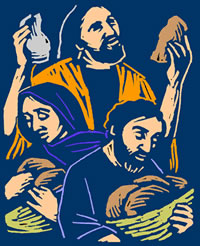
18th Sunday in Ordinary Time Year A
Having completed Matthew’s collection of Kingdom parables, we are now reading from the narrative section that follows. The response of the people of Galilee has been disappointing, and Jesus turns his attention to forming the group of disciples who are to carry on his mission. The miracle of the feeding of the multitude must have been remembered as of great significance by the first Christians – it is recounted in all four gospels. This incident, it seems, gave rise to different traditions of presentation, both of which are included in Matthew’s gospel. Today’s presentation is for a Palestinian community – the twelve baskets symbolise the feeding of the tribes of Israel. The other narrative is the telling of the story in a gentile context – with seven baskets symbolising the seven gentile nations referred to in the biblical traditions.
As the only miracle in which the disciples are called by Jesus to play a part, it is an excellent introduction to this narrative of the formation of the disciples by Jesus. When they suggested that the people leave Jesus to find food, he replies, ‘Give them something yourselves’. Then, when they produced two loaves and two dried fish, he broke the loaves and handed them to his disciples, who gave them to the crowd. As we listen to this reading, it is not difficult to recognise that the early Christian communities looked back on this incident as a foreshadowing of the Eucharist. Today’s liturgy opens up the vast perspectives suggested by this awareness.
The first reading from Isaiah reminds us of the Old Testament’s amazing tradition of faith and piety – something that has been long neglected in our Catholic awareness. The words of the prophet are not artful poetry, but the expression of the faith and trust that sustained God’s faithful people during their disastrous exile in Babylon. God’s people – especially those who have nothing – are called to the Lord’s feast. The only condition of partaking is a thirst for God. If they respond, and ‘come’ to the Lord’s table, they will find ‘life’, and they will share in the blessings of an ‘everlasting covenant’. If only we came to our celebration of the Eucharist with similar dispositions.
The Eucharistic awareness of the first Christians communities is reflected in all the gospels, in a narrative that clearly echoes their liturgy of the ‘breaking of bread’, Jesus ‘says the blessing’, ‘breaks the loaves’, and has his chosen disciples minister to the people. The crowd in the traditional story handed on by Matthew was immense. 5000 men with their families would have amounted to 20 or 30 thousand – about 10% of the population of Palestine at the time! As we know, numbers in the scriptures are often symbolic. Clearly, this miracle is remembered as of momentous significance - inclusive of the whole people.
Today’s reading from the letter to the Romans fits well in a liturgy celebrating the greatness of the Eucharist. This central sacrament of the Church’s common life ‘in Christ’ is a celebration of God’s love ‘made visible in Christ Jesus our Lord’. Paul assures the Christians of Rome, for whom persecution for the faith has already been a personal experience, that no power, visible or invisible, can come between them and the Saviour’s love revealed to the world in Eucharistic celebration of the Paschal Mystery.
John Thornhill sm

